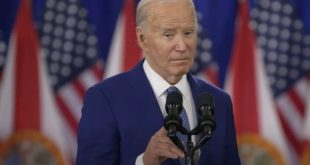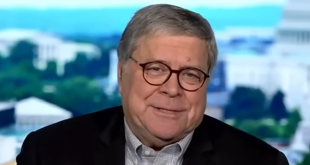WASHINGTON — The Biden administration has decided to fight a legal battle to keep secret most of a Trump-era Justice Department memo related to Attorney General William P. Barr’s much-disputed declaration in 2019 that cleared President Donald J. Trump of illegally obstructing justice in the Russia investigation.
In a late-night filing on Monday, the Justice Department appealed part of a scathing district court ruling that ordered it to make public the entire memo. Two senior department officials wrote the document at the same time that they were helping Mr. Barr draft a letter to Congress claiming that the evidence in the report, which was still secret at the time, was insufficient to charge Mr. Trump with a crime.
The still-redacted portion of the document examines nearly a dozen episodes presented as raising obstruction of justice concerns that were detailed in the report by the special counsel, Robert S. Mueller III, and has at least two sections, according to two people briefed on it.
One laid out potential legal theories under which Mr. Trump could have been prosecuted, the people said. The other examined whether the evidence for any of the episodes constituted proof beyond a reasonable doubt. The memo is said to conclude that no charge was viable.
The decision to keep hiding that analysis from public scrutiny puts the Biden administration in the politically awkward position of trying to cover up a record that would shed new light on an act by Mr. Barr that Democrats consider notorious. But it also enables the department to defend two institutional interests: its ability to keep internal legal analysis secret and the actions of career officials whom a judge accused of misleading the court.
The Justice Department did release the first page and a half of the nine-page memo. While Mr. Mueller had declined to render a judgment about whether to prosecute Mr. Trump because the department’s policy was not to charge a sitting president, the memo said that Mr. Barr should offer his opinion of the evidence to shape public understanding of the report.
“Although the special counsel recognized the unfairness of levying an accusation against the president without bringing criminal charges, the report’s failure to take a position on the matters described therein might be read to imply such an accusation if the confidential report were released to the public,” wrote Steven A. Engel and Edward C. O’Callaghan, two senior Justice Department officials during the Trump administration.
The department also consented to releasing additional portions of the ruling this month by Judge Amy Berman Jackson, in which she had labeled its previous filings to her about the memo as “disingenuous.” Portions of her ruling that discussed the first part of the memo had been redacted.
The court on Tuesday unsealed a more fulsome version of the ruling. It revealed that Judge Jackson had also accused the department of having “deliberately obscured” material in the memo that contradicted the notion that Mr. Barr needed to offer a public opinion about the prosecutorial merit of the evidence amassed by Mr. Mueller. The exercise, she said, was instead “purely hypothetical” and fundamentally about “getting a jump on public relations.”
Noting that she had discovered the existence of this first part of the memo only after she insisted on reading it for herself rather than relying on the department’s representations about it, Judge Jackson also wrote: “D.O.J. made a strategic decision to pretend as if the first portion of the memorandum was not there and to avoid acknowledging that what the writers were actually discussing was how to neutralize the impact of the report in the court of public opinion.”
The new Justice Department filing apologized for — but also defended — its Barr-era assertions to the court about the memo. It said that department officials could have been clearer, but that they were nevertheless accurate on the central legal question: whether the nature of the memo was pre-decisional and deliberative and thus exempt from disclosure. Any missteps, it argued, did not warrant releasing the entire document.
Mr. Barr’s claim that the evidence did not show that Mr. Trump had committed any chargeable crime of obstruction has been widely criticized as deeply misleading. Among other fallout, a government watchdog group, CREW, filed a Freedom of Information Act lawsuit in the United States District Court in Washington seeking disclosure materials about the matter, leading to the fight over the memo.
The Mueller report itself — which Mr. Barr permitted to become public weeks after his letter to Congress created an impression that the fruits of the inquiry had cleared Mr. Trump of obstruction — detailed several actions by Mr. Trump that many legal specialists say were sufficient to ask a grand jury to indict him on charges of obstruction of justice.
Those actions included Mr. Trump’s attempt to bully his White House counsel, Donald F. McGahn II, into putting out a statement or writing a memo that would falsely deny that the president had directed him to fire Mr. Mueller — effectively falsifying evidence that would have contradicted Mr. McGahn’s witness testimony about that event.
Mr. McGahn, who refused to relay directions to remove Mr. Mueller and to later falsely deny that episode, according to the Mueller report, will privately testify next week before the House Judiciary Committee about such matters.
Mr. Trump’s actions also included dangling a potential pardon to his former campaign chairman, Paul Manafort, to encourage him not to cooperate with investigators.
Mr. Trump later pardoned Mr. Manafort, who had refused to cooperate with Mr. Mueller about certain key matters.
Testifying before the Senate Judiciary Committee in May 2019, Mr. Barr offered some explanations for why he did not think charges were merited for a few of the 10 episodes that the Mueller report had recounted as raising obstruction concerns. One of the people said that testimony drew upon and dovetailed with the still-hidden portions of the memo.
“We took each of the 10 episodes, and we assessed them against the analytical framework that had been set forth by the special counsel,” Mr. Barr said at the time. “And we concluded that the evidence developed during the special counsel’s investigation was not sufficient to establish that the president committed an obstruction of justice offense.”
For example, several episodes centered on Mr. Trump’s use, or attempted use, of his power to remove subordinate officials in the executive branch. They included his firing in 2017 of the F.BI. director James B. Comey Jr. — the act that led to Mr. Mueller’s appointment — and his unsuccessful efforts to persuade subordinates to have Mr. Mueller fired.
Mr. Barr testified that “as a matter of law,” the obstruction statutes enacted by Congress did not limit the president’s power to remove a special counsel.
That view, which is contested, comports with his own sweeping theory of presidential power. Still, in the deliberations, department officials also focused on the lack of historical precedent for prosecuting a current or former president for firing a subordinate, the two people said.
In his testimony, Mr. Barr also maintained that the evidence was insufficient to prove that Mr. Trump had deliberately sought to criminally obstruct the investigation, apart from legal theories.
For example, Mr. Barr said, a major reason that Mr. Trump fired Mr. Comey was his “refusal to tell the public what he was privately telling the president, which was that the president was not under investigation.” Mr. Trump’s rationale for trying to fire Mr. Mueller was a purported conflict of interest, and had Mr. Trump succeeded, Mr. Barr said, a replacement would “presumably” have been appointed.
But the Trump Justice Department never made public its comprehensive analysis of all the episodes the Mueller report laid out. That is the analysis the Biden administration is seeking to keep secret.
Judge Jackson had given the department until Monday night to respond to her order to disclose the memo — and, by extension, her finding that officials had been “disingenuous to this court” about its nature in court filings by arguing that it could be lawfully kept secret.
In addition to officials omitting the existence of the first part of the memo in descriptions of it that were submitted to her, Judge Jackson also blasted the characterization of the document as pre-decisional. Mr. Barr, she wrote, had already decided not to initiate any prosecution of Mr. Trump when the memo was written, and it was instead about strategy and arguments that could be mustered to support that decision.
In its filing, the Biden Justice Department said that the previous filings “could have been clearer, and it deeply regrets the confusion that caused.” But it also insisted that the department’s “declarations and briefs were accurate and submitted in good faith.”
The department also put forward a narrow view of the problems with its previous statements about the memo, focusing on imprecision about whether Mr. Barr had been considering whether to commence a prosecution of Mr. Trump at that moment — as it had suggested in some places — or whether he was opining on whether Mr. Trump could be charged after he left office.
Although Mr. Engel and Mr. O’Callaghan completed the memo after Mr. Barr had decided to say the evidence would not support obstruction charges, the department argued that the legal analysis portion of the memo memorialized advice they had provided before Mr. Barr made that decision.
“The government acknowledges that its briefs could have been clearer, and it deeply regrets the confusion that caused,” the Biden Justice Department’s filing said. “But the government’s counsel and declarants did not intend to mislead the court, and the government respectfully submits” that any missteps still did not warrant releasing the entire memo.
Katie Benner and Michael S. Schmidt contributed reporting.
 Top Naija News: Nigerian News, Breaking News Nigeria and World News Top Naija News is a daily news publication in Nigeria, delivering the latest breaking news in Nigeria and around the world.
Top Naija News: Nigerian News, Breaking News Nigeria and World News Top Naija News is a daily news publication in Nigeria, delivering the latest breaking news in Nigeria and around the world.



